How Brexit broke 'Team Ruth'
 Jeff J Mitchell
Jeff J MitchellThey were to operate as Team Ruth - a block of Scottish MPs under the leadership of Ruth Davidson.
If Theresa May wanted them to vote one way and Ms Davidson wanted them to vote another, they would follow the Scottish leader's line.
At least that was what journalists like me were briefed as Ms Davidson assembled her baker's dozen of MPs under the shadow of Stirling Castle for a photo shoot in the aftermath of the 2017 election.
In reality, the Scottish and UK Conservative line has - more or less - been the same during the tortuous Brexit process.
Most Scottish Tories have toed it. But there have been exceptions. Some MPs have dared to do their own thing (or at least to follow someone else's lead).
In short, Brexit has broken the unity of Team Ruth.
There is within the Scottish Tory group at Westminster a milder micro study of the division that threatens to pull the wider party apart.
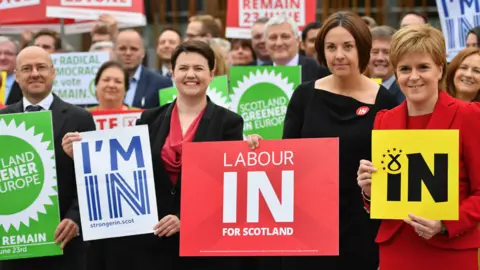 Jeff J Mitchell
Jeff J MitchellAt one end of the spectrum, there is Aberdeen South MP Ross Thomson, a Brexit supporter close to Boris Johnson who has twice voted against Theresa May's deal.
In the first meaningful vote, he was joined by Moray MP Douglas Ross and John Lamont, the MP for Berwickshire, Roxburgh and Selkirk.
All three said they were particularly worried about the threat they perceived the so-called Northern Ireland backstop would pose to the integrity of the UK.
By the second meaningful vote, Mr Lamont was back on side with the government having accepted the EU's reassurances that the backstop, if used, would be temporary.
Douglas Ross missed that vote to return home to be with his wife for the birth of their first child.
When asked how he would have voted, he said he would have listened to the debate before making up his mind.
That left Ross Thomson as the only Scottish Tory rebel on that occasion.
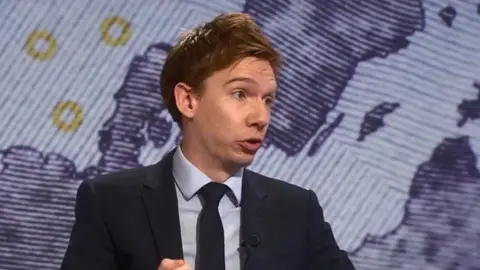
Towards the other end of the Brexit spectrum is the East Renfrewshire MP Paul Masterton.
He has been promoting a softer Brexit along the lines of Norway-plus. That's staying in the European single market (like Norway) plus maintaining a customs union with the EU (unlike Norway).
He did, however, loyally back the prime minister's Brexit deal in both meaningful votes and urged Brexiteer MPs to do the same or risk no Brexit.
The breaking point for him came when Parliament was asked to vote on ruling out no deal in all circumstances.
The government instructed its MPs to reject this idea.
Mr Masterton refused. He voted against no deal and resigned as a government aide at the Home Office.
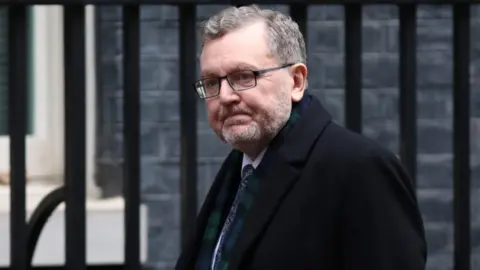 Getty Images
Getty ImagesThis vote also caused difficulty for the Scottish Secretary, David Mundell, the MP for Dumfriesshire, Clydesdale and Tweeddale.
He could not bring himself to either vote against the government or to vote against ruling out a no deal Brexit.
He was one of several Cabinet ministers to abstain, in a breach of collective responsibility that was tolerated by the prime minister, such is the weakness of her position.
Mr Mundell has advocated MPs choosing between Brexit options through indicative votes.
However, when it came to the decision on that idea - the amendment in the name of Oliver Letwin - Mr Mundell voted against, as he was obliged to do to keep his government job.
Paul Masterton was the only Scottish Tory MP to vote for these indicative votes, presumably so that he can support a softer Brexit.
Whether he will be free to do so, or will have to continue rebelling against the Conservative whip to express his preferences remains to be seen.
The government has yet to say whether or not it will allow its MPs - including ministers - the freedom to vote as they wish.
How united are the SNP and Labour?
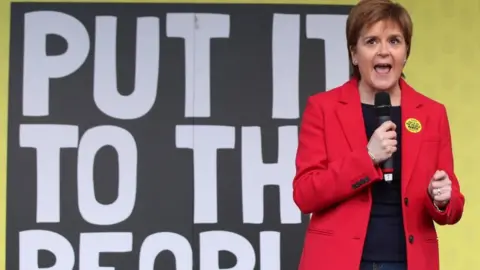 PA
PABrexit has caused tensions in other Scottish parties too.
Labour's Ian Murray, the MP for Edinburgh South, has consistently championed another Brexit referendum, which has not yet become the preferred option of the party's leadership.
In the SNP, some MPs believe their leader - Nicola Sturgeon - should be prioritising a second independence referendum over another UK-wide public vote on Brexit.
Former Scottish cabinet minister Alex Neil and former party deputy leader Jim Sillars - who supported Brexit - have urged SNP MPs to back Mrs May's deal.
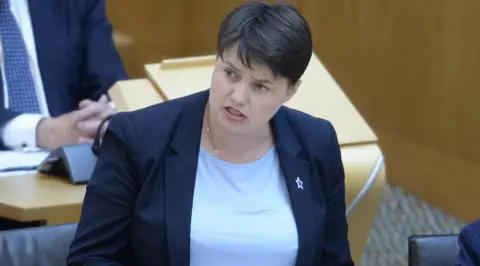 Getty
GettyBut as the party of government at Westminster, inevitably the greatest focus is on the Conservatives.
On the key Brexit questions, Ruth Davidson's current thinking is not known as she is on maternity leave after giving birth in October last year to her son Finn.
She has made occasional political interventions in the months since his arrival - via social media - most notably to back Theresa May when she faced a confidence vote as leader of the Conservative party.
It would be fascinating to know what she thinks now and which part of Team Ruth at Westminster is acting as she would wish.
